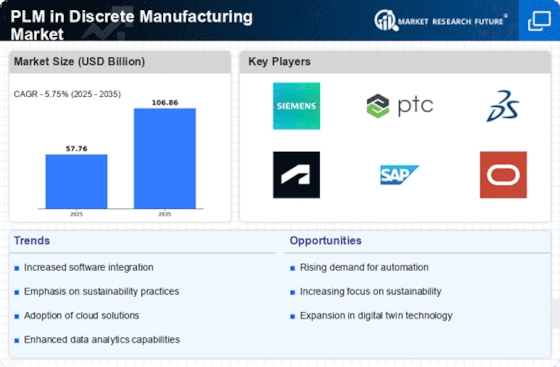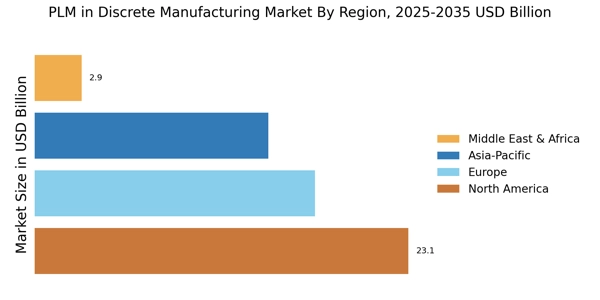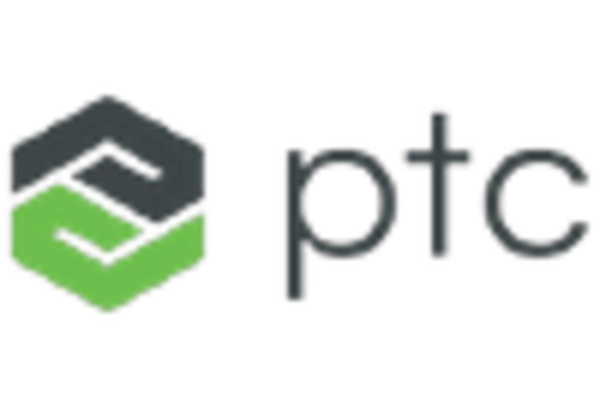Focus on Sustainability
Sustainability has emerged as a pivotal driver in the PLM in Discrete Manufacturing Market. Manufacturers are increasingly adopting sustainable practices to meet regulatory requirements and consumer expectations. The shift towards eco-friendly materials and processes is not merely a trend; it is becoming a necessity. According to recent data, 70% of consumers are willing to pay a premium for sustainable products, which compels manufacturers to rethink their product development strategies. PLM systems that incorporate sustainability metrics enable companies to track their environmental impact throughout the product lifecycle. This focus on sustainability not only enhances brand reputation but also opens new market opportunities, thereby reinforcing its significance in the PLM in Discrete Manufacturing Market.
Integration of Advanced Technologies
The integration of advanced technologies such as artificial intelligence, machine learning, and the Internet of Things is driving the PLM in Discrete Manufacturing Market. These technologies enhance product lifecycle management by enabling real-time data analysis and predictive maintenance. For instance, AI algorithms can analyze historical data to forecast potential failures, thereby reducing downtime and improving efficiency. The market for AI in manufacturing is projected to reach USD 16.7 billion by 2025, indicating a robust growth trajectory. Furthermore, IoT devices facilitate seamless communication between machines, allowing for better monitoring and control of production processes. This technological synergy not only streamlines operations but also fosters innovation, making it a critical driver in the PLM in Discrete Manufacturing Market.
Customization and Personalization Trends
Customization and personalization trends are reshaping the PLM in Discrete Manufacturing Market. As consumer preferences shift towards tailored products, manufacturers are compelled to adapt their strategies to meet these demands. The rise of mass customization has led to the need for flexible PLM systems that can accommodate varying specifications without compromising efficiency. Data suggests that 30% of consumers are willing to pay more for personalized products, indicating a lucrative market opportunity. PLM solutions that support customization enable manufacturers to streamline the design and production processes, ensuring that they can respond swiftly to market changes. This adaptability is essential for maintaining competitiveness in the dynamic landscape of the PLM in Discrete Manufacturing Market.
Enhanced Collaboration and Communication
Enhanced collaboration and communication among stakeholders is a crucial driver in the PLM in Discrete Manufacturing Market. As products become more complex, the need for effective collaboration across various departments, including design, engineering, and supply chain, has intensified. PLM solutions facilitate this by providing a centralized platform for information sharing, which reduces errors and accelerates time-to-market. Data indicates that companies with strong collaborative practices are 5 times more likely to be high-performing. By fostering a culture of collaboration, organizations can leverage diverse expertise, leading to innovative solutions and improved product quality. This trend underscores the importance of collaboration in the evolving landscape of the PLM in Discrete Manufacturing Market.
Regulatory Compliance and Risk Management
Regulatory compliance and risk management are increasingly influencing the PLM in Discrete Manufacturing Market. As industries face stringent regulations regarding product safety, quality, and environmental impact, manufacturers must ensure that their products meet these standards throughout the lifecycle. PLM systems play a vital role in managing compliance by providing tools for documentation, tracking changes, and ensuring adherence to regulations. The market for compliance management solutions is expected to grow significantly, reflecting the rising importance of risk management in manufacturing. By integrating compliance into the PLM process, companies can mitigate risks, avoid costly penalties, and enhance their market position, thereby highlighting the critical nature of this driver in the PLM in Discrete Manufacturing Market.

















